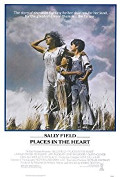
Directed by
Robert Benton
111 minutes
Rated PG
Reviewed by
Bernard Hemingway


Places In The Heart
Although Places in the Heart with its Southern rural setting and elegiac tone feels very much like an adaptation of a novella by, say, Katherine Anne Porter, it is in fact written by director Robert Benton, writer-director of the 1979 Oscar winner Kramer vs Kramer who drew on his memories of growing up in Waxahachie, Texas in the shadows of the Great Depression for this poignant story of a group of misfits struggling to survive in an indifferent world.
Sally Field won her second Oscar (her first was for Norma Rae in 1979 in which she similarly played a battling single mother) for her portrayal of Edna Spaulding, a mother of two young children whose husband is accidentally shot by a black youth. Rather than lose the family farm she enlists the aid of a black drifter (Danny Glover) and takes in a blind boarder, Mr. Will (John Malkovich), in a do-or-die attempt to retain the life she loves.
Although its title does the film no favours it is in fact both a convincing evocation of a time and place (it was filmed in and around the real town of Waxahachie by veteran cinematographer Nestor Almendros who had lensed Kramer vs Kramer), with its KKK racism and heartless banks foreclosing on failing small farmers (and includes for good measure a superbly-staged tornado attack) and a gently moving story of poor folks winning through as Edna leads the fight to save the farm. Lest the story become too much of a hokey celebration of native pluck, Benton introduces a sub-plot involving Edna’s beautician sister, Margaret (Lindsay Crouse) and husband (Ed Harris) who is having an affair with one of Margaret’s close friends (Amy Madigan), something which, of course, only leads to regret for all concerned. While introducing a balancing note of human folly this is still presented with sympathy by Benton, who won a Best Original Screenplay Oscar for his well-turned script.
The cast are all highly effective with Field giving an outstanding performance as her character evolves from frightened little housewife to head of the house, John Malkovich in his first major screen role credible as the sightless boarder and Danny Glover adding some humour as Edna’s right-hand man.
Touching without being mawkish my only reservation is the final scene, one which I imagine would have caused a considerable amount of discussion on the part of the producers, and which opts for a Christian ideality lifting the film out of its real-world setting and into one wished for. It kind of fits with the spirit of the film but it seems odd nevertheless.
Want something different?





